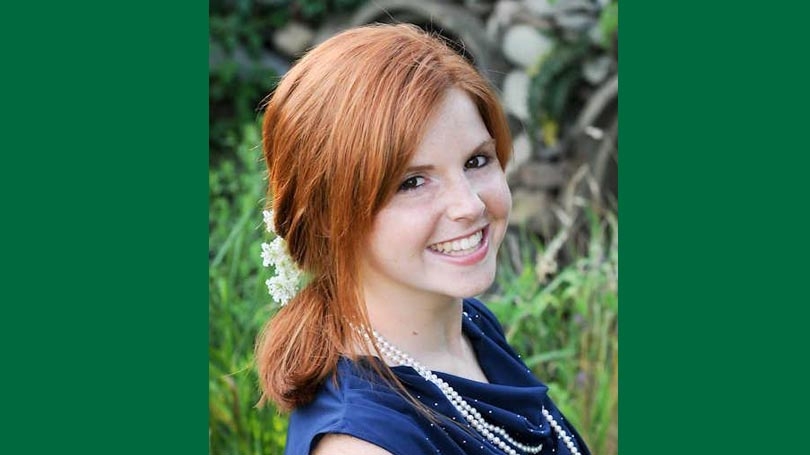
Keighley Rockliffe is a first year PhD candidate in the Physics and Astronomy department working under Professor Elisabeth Newton
This is part of a series of articles profiling up-and-coming female STEM graduate students on Dartmouth’s campus, in recognition of International Women’s Day on March 8th.
“I first noticed it in my undergraduate physics courses. The men in my cohort displayed an uncanny self-confidence not exuded by my female colleagues.”
Keighley Rockcliffe, a first-year graduate student in the Department of Physics and Astronomy at Dartmouth, pauses, then resumes.
“It was an interesting dynamic to observe. If you posed a hypothetical, women were uncertain of the best response, and would need to ask more questions. Men would state an answer forthright, whether it was accurate or not.”
Keighley has always been unequivocally excited about astrophysics. The endless possibilities of unanswered questions in the fields of physics and astronomy have been a great draw and she began her bachelors’ degree in Physics at Rensselaer Polytechnic Institute (RPI), New York, with curiosity and enthusiasm. As time went on and courses became more difficult, anxiety started to build within her about how little she knew about the major she had chosen.
Between acclimating to being a woman in a male-dominated field and juggling difficult coursework, she began to fully realize the competitive nature of her undertaking. She struggled to fit extracurricular activities into her life, and instead buried herself in what she knew she loved best: answering the unanswered. She earned her bachelor’s degree in 3 years.
Keighley stayed at RPI to pursue two master’s degrees under the tutelage of Dr. Heidi Newberg during which she analyzed the location and movement of tidal streams: little leftover nuggets of ancient dwarf galaxies floating through the Milky Way. Not unlike lighthouses, the stars in these dwarf galaxies emit beacons of identifying information through darkness. This information is in the form of their distinct densities and trajectories, which are unique from those of stars in our galaxy, making them easy to identify. Keighley became obsessed with understanding how these little lighthouses made their way into our galaxy over billions and billions of years. Despite enthusiasm for her research, however, doubts about her own ability and capabilities had taken root and she felt that she was sinking further into a Black Hole, even questioning whether she should continue in the field.
In a last-ditch mission to renew her spirit, Keighley applied for and was awarded an internship at NASA’s Goddard Space Flight Center. Diving headfirst into heliophysics, Keighley examined how explosions of plasma and magnetic field structure from the sun clash with planets and other celestial objects that happen to cross their path. The most ardent observation, however, came from her experience in a new, welcoming research environment. “I finally felt comfortable asking questions,” Keighley recalls. “I felt like a capable scientist for the first time in my career.” She rekindled her interest in pursuing a doctorate degree and, at the encouragement of her advisor at Goddard, chose Dartmouth College for her studies. She had noted the department’s emphasis on working hard and focusing on research but still maintaining a health work-life balance: “I knew I could be happy here, but still do impactful research,” Keighley says.
Though only in her first year at Dartmouth, Keighley is impressed with her department’s drive towards increasing female representation at the faculty level and joined the lab of one of the department’s newest professors, Dr. Elisabeth Newton. Keighley has just begun answering the question of how stars interact with the planets they host. In spectra from the Hubble Telescope, she hunts for evidence of lower-than-expected flux of light at specific wavelengths surrounding exoplanet K2-25B, which is about the size of Neptune. Missing light emission when observing the host star’s light signal through the exoplanet’s atmosphere might indicate atmospheric changes that emerge from evaporation. Since the exoplanet is so close to its host star, any atmospheric evaporation observed could be attributed to the host bombarding the planet with high-energy radiation. When asked whether there’s any realm of astrophysics she hasn’t yet explored, Keighley laughs. “I’m very happy working under Dr. Newton, and I hope to continue working within the stellar and exoplanet research community.”
Keighley echoes the sentiments of many graduate women at Dartmouth: enhanced interaction across programs and departments would encourage collaboration and a positive research environment. Motivated by her desire to meet other students, she joined the Graduate Student Council, where she is enjoying the opportunity to interact with students with a range of experiences. One such experience is through her involvement as the Graduate Enrollment Director for the ManyMentors at Dartmouth program, which connects local high school students interested in STEM, especially those from underrepresented backgrounds, with resources and role models at the College. “I am so incredibly proud of all the Dartmouth undergraduates, graduates, and professors who have signed on to become a part of this,” Keighley shared. It’s amazing to see scientists not only promoting each other, but helping lift up the next generation of scientists.”
Keighley maintains a positive perspective on Dartmouth’s recent efforts to support women in STEM, pointing to administrative responses to sexual misconduct and plagiarism allegations and remaining hopeful for change. Administrative staff, and especially Dean Jon Kull, are advocating for graduate students, she says, and work hard to be visible and available to students. Finally, she is excited to see her fellow graduate student population become more vocal and working together to create a happy and healthy environment for women in STEM.